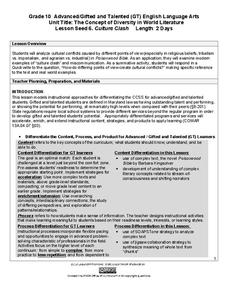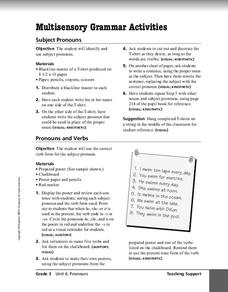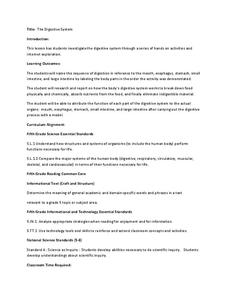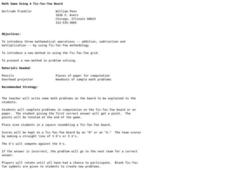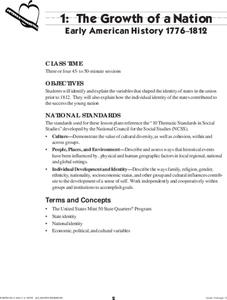Southern Poverty Law Center
Analyzing Gender Stereotypes in Media
Why might toy advertisers use gender stereotypes to sell their products? Young people think critically about media messages and its role in gender stereotyping with a thought-provoking lesson plan.
The New York Times
Literary Pilgrimages: Exploring the Role of Place in Writers’ Lives and Work
Do the places you have lived influence what you write? Class members research the lives of writers and look for how places these writers have lived might have influenced their writings.
Maryland Department of Education
The Concept of Diversity in World Literature Lesson 6: Culture Clash
To prepare for a Quickwrite on the question, "How do different points of view create cultural conflicts?" class groups draw examples of religious, cultural, and political conflicts from Things Fall Apart and The Poisonwood Bible to use...
Houghton Mifflin Harcourt
Multisensory Grammar Activities
Meet your scholar's individual needs with four activities designed to address auditory, visual, and kinesthetic learning styles to reinforce the concept of subject and object pronouns.
Pocumtuck Valley Memorial Association
A Research Project: A Discussion of the Recreating and Populating of a Colonial Village
Primary source research, secondary source readings, and discussion provide the understanding necessary for students to create a colonial persona, and simulate a situation appropriate for this person, time, and place. While the lesson...
Edgate
Why Map a Map?
After brainstorming reasons why Native Americans mapped their lands, your young critical thinkers will work together to review their ideas and determine the definition of a map. With today's extensive use of mapping technology and GPS...
Curated OER
What's in a Name? Considering the Shakespeare Authorship Question
Did Shakespeare really write all that stuff? After viewing a trailer for the film, Anonymous and reading Stephen Marche’s article “Wouldn’t It Be Cool If Shakespeare Wasn’t Shakespeare?” class groups read articles about the Shakespeare...
Curated OER
The Kite Runner: Anticipation Guide
Introduce Khaled Hosseini's The Kite Runner with an anticipation guide that asks class members to consider their opinions on a series of statements related to themes presented in the novel.
Curated OER
Everybody Needs a Little Sunshine
Three activities introduce upper elementary ecologists to photosynthesis and food webs. In the first, an experiment is set up to determine how plants respond to different types of light. In the second, they connect organism cards with...
National Gallery of Canada
Reinventing the World
After examining and discussing Guy Ben-Ner's Treehouse Kit, a contemporary art installation with a sculptural and video element, small groups work together to create short silent films. The films should be built around a particular topic...
Curated OER
The Digestive System
Discover how the human body's digestive system works with a brain and stomach friendly activity. Scholars taste test a variety of foods to find out how they behave once in the mouth. Class members then play a game called Move That...
Curated OER
Math Game Using A Tic-Tac-Toe Board
Elementary schoolers play a math game using a Tic-Tac-Toe Board. This simple idea can be used with virtually any grade level. A team of learners are the "O's," and the other is the team of "X's." Each time a team gets a problem correct,...
Curated OER
Sense Poetry
Access your young poets' senses and emotions with this activity, which guides them through the process of writing a "sense poem." After working on a sense poem as a class and modeling the procedure, individuals work on their own poems...
Curated OER
What's The Story?
Teams of learners integrate reading, writing, math, social studies, and science in this simple, yet effective lesson. They work in groups in order to solve a ten-step problem which requires internet research, the use of a calculator, and...
Curated OER
Phonemic Awareness: Phoneme Blending
This resource is more of a suggestion than a full lesson. It explains how young pre-readers can work with their teacher to practice blending phonemes to make words. The class watches the teacher as she says and orally segments a word...
Curated OER
Elaborating the Main Idea, Using Supporting Details
A desk is used as a visual analogy to construct the main idea and supporting details in a story. The top of the desk is the main idea, and each of the four legs provides supporting details. The legs of the desk provide support for the...
Virginia Department of Education
Revising Writing
Junior high writers investigate other student’s sample writing and critique on how it could be improved. Skill emphasis is place on elaboration, voice, and sentence variety. The student writing is provided, but the checklist for revision...
National Endowment for the Humanities
Understanding the Context of Modernist Poetry
Students examine the historical, social, and cultural context of modernist poetry. They explore websites, complete a chart, compare/contrast rural and urban life, watch a video of early New York, and complete a writing assessment...
US Mint
The Growth of a Nation
Young historians explore the identity of the early United States in this four-part lesson series. Working in groups of three, students research the political, economic, and cultural atmosphere of each member of the union prior to 1812,...
Curated OER
Classifying Plants and Insects
Art and science come together in a lesson based on Flower Still Life by Ambrosius Bosschaert the Elder. Learners classify plants and insects in the painting by color, leaf shape, size, reproduction, and season of bloom.
Other popular searches
- Using Reference Materials
- Word Reference Materials
- Library Reference Materials
- Reference Materials Esl
- Studying Reference Materials
- How to Reference Materials
- Reference Materials Games
- Reading Reference Materials
- Punjabi Reference Materials
- Reference Materials Worksheets
- Internet Reference Material
- On Line Reference Material




